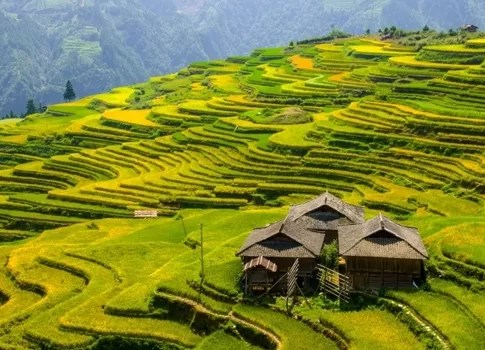In the rolling mountains of Congjiang County, located in southwest China’s Guizhou Province, lies a centuries-old agricultural practice that could offer the world a sustainable way to reduce reliance on herbicides and pesticides. Known for its lush rice paddies, this region is home to an ancient farming method where rice, fish, and ducks thrive together in harmony. This rice-fish-duck system has been passed down through generations and continues to provide a model of ecological balance and agricultural efficiency.
A Time-Tested Agricultural System
For thousands of years, farmers in Congjiang County have cultivated rice, raised fish, and bred ducks in the same paddy fields. This harmonious ecosystem allows each species to benefit the others, promoting a natural cycle that significantly reduces the need for chemical inputs. Rice fields provide food and shelter for fish and ducks, while the fish and ducks play a critical role in pest control. By consuming insects and weeds, they eliminate the need for harmful pesticides and herbicides. Their droppings act as organic fertilizer, enriching the soil and promoting healthy rice growth.
This sustainable agricultural method was recognized in 2011 when the rice-fish-duck ecosystem was named a pilot project under the Globally Important Agricultural Heritage Systems (GIAHS). Two years later, it was honored as part of China’s first batch of important agricultural cultural heritages, showcasing its historical and environmental significance.
Global Attention on Sustainable Practices
In 2022, the system gained international attention during the 15th Conference of the Parties to the United Nations Convention on Biological Diversity, held in Canada. The rice-fish-duck system of Congjiang County was presented as a shining example of how ancient agricultural practices can contribute to biodiversity conservation and sustainable farming. By showcasing this ancestral knowledge, Congjiang’s farmers demonstrated to the world how traditional farming techniques can reduce environmental damage while fostering rural development.
The system’s success was further acknowledged in 2023, during the fourth call for the Global Solicitation on Best Poverty Reduction Practices. This recognition highlights how the rice-fish-duck ecosystem not only preserves the environment but also lifts local communities out of poverty through eco-friendly, sustainable agricultural practices.
A Model for Rural Revitalization and Poverty Reduction
The rice-fish-duck system has played a critical role in Congjiang County’s rural revitalization efforts. By maintaining this environmentally friendly practice, local farmers have been able to protect their cultural heritage while boosting their incomes. The harvest includes not just rice but also fish and ducks, all of which provide multiple sources of revenue. The system’s efficiency ensures that farmers can continue to thrive without resorting to expensive or harmful chemicals, allowing for healthier crops and a more robust local economy.
As Congjiang County preserves this sustainable farming model, it also safeguards its cultural identity. The Dong people, who make up 90% of the population, have cultivated a unique variety of rice called Kam Rice for generations. This staple crop is central to their agricultural traditions, and its cultivation is woven into the region’s ethnic heritage.
Biodiversity Meets Cultural Preservation
In Congjiang County’s mountainous villages, the scenic beauty of traditional agriculture merges with the rich cultural traditions of the Dong and other ethnic groups. Traditional homes, drum towers, and ancient barns dot the landscape, while golden rice hangs to dry in rows during the autumn harvest. This timeless agricultural scene not only enhances the local ecosystem but also draws visitors to witness the enduring legacy of the rice-fish-duck system.
A Global Idea for Sustainable Agriculture

The rice-fish-duck ecosystem in Congjiang County demonstrates that solutions for sustainable agriculture don’t always need to rely on new technologies or chemicals.
Instead, looking to the past can reveal innovative ideas that meet the needs of modern farming.
By reducing dependency on herbicides and pesticides, this ancient system could serve as a blueprint for farmers worldwide.
As more countries explore ways to balance agricultural productivity with environmental protection, adopting elements of this traditional Chinese system could be key to fostering both food security and ecological resilience on a global scale.
The success of Congjiang County’s rice-fish-duck farming provides hope that other regions might also reduce chemical use while enhancing biodiversity, all while preserving cultural heritage. As global conversations continue around sustainable farming, Congjiang’s story reminds us that sometimes, the best solutions are already in place—they simply need to be rediscovered and shared.
Further reading from Amazon
Farming with Native Beneficial Insects: Ecological Pest Control Solutions (affiliate link)
Related Stories
A Farmer’s Guide to Growing Bamboo
Farm Forestry or Agroforestry in Australia
Choosing the Best Trees for Farm Forestry in Australia
Should You Buy at Farmer’s Markets or Supermarkets?
Farmers threatened with gas exploration on critical agricultural land
Advertisement:




